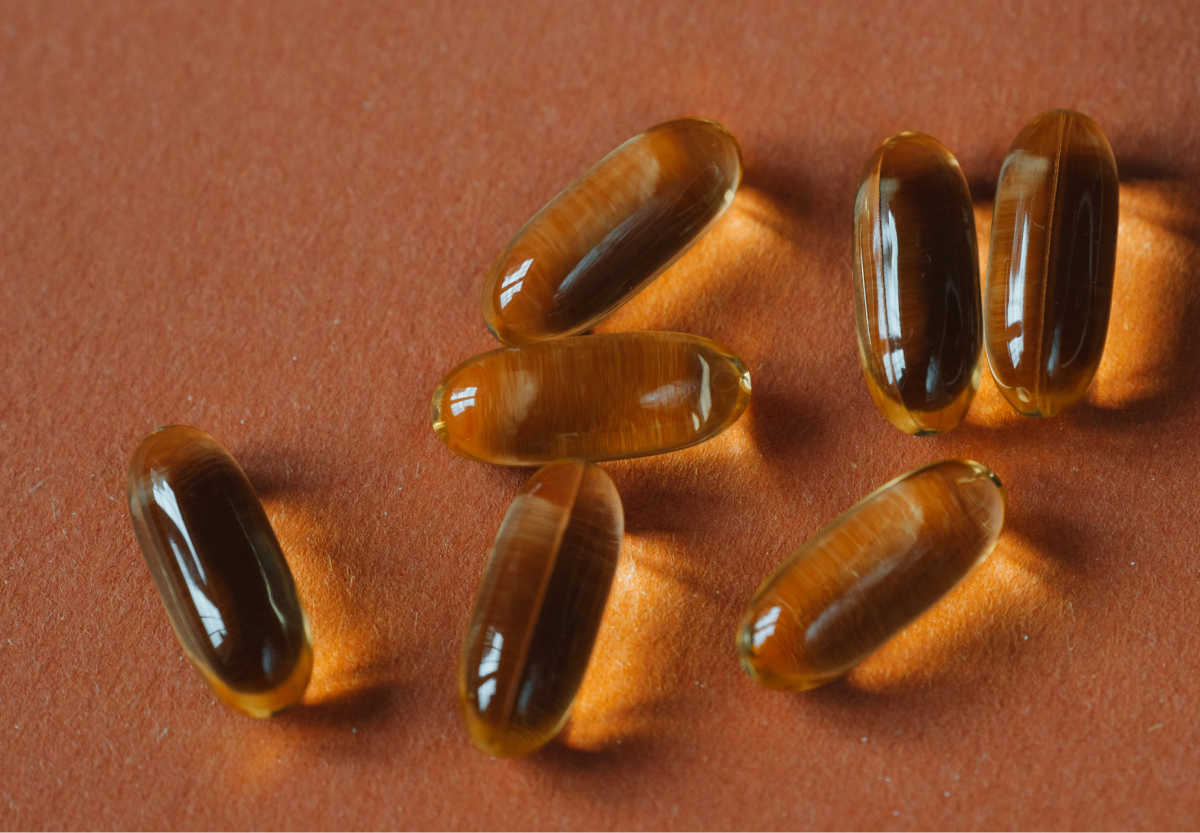Prediabetes and Supplements: A Guide to Selecting the Most Beneficial
.webp)
Key Takeaways
There seems to be a supplement for almost everything these days, so it’s not surprising there’s a lot of buzz about supplements to lower blood sugar and prediabetes.
And it’s true that some supplements (taken with medical advice, of course) may have beneficial effects for people with prediabetes. Let’s take a look at what those are, what risk factors and side effects to consider, and what other health benefits they may have.
What Is Prediabetes and Why Does It Matter?
Prediabetes is when the body’s blood sugar level is higher than normal. So, they’re higher than normal blood sugar levels in an average person but not high enough to be type 2 diabetes.
Think of prediabetes as a yellow caution light. It’s telling you to slow down, reassess your diet and lifestyle habits, take action, and make healthy living a priority. Early intervention in prediabetes is key to preventing its progression, reversing it, or lowering your risk of type 2 diabetes.
The Importance of Early Intervention and Lifestyle Management

According to an expert panel from the American Diabetes Association (ADA), up to 70 percent of people with prediabetes will eventually develop type 2 diabetes.
And even if you’re not at immediate increased risk, remember that the symptoms of prediabetes are often absent or subtle (you could just be thirstier or have increased, unexplained hunger or fatigue, for example), so you could miss many of the early signs. In fact, more than 80% of people don’t even know that they have the condition!
Can Supplements Really Help Manage Prediabetes?
Supplements may help manage prediabetes to some extent, although not all medical experts agree. For example, some studies and randomized controlled trials show that taking supplements like zinc can have a positive effect on reducing blood glucose, which in turn decreases insulin resistance.
Even though dietary supplements must have a label with the active ingredients, they are not regulated by the FDA the same way the medications are. So, the ingredients and quality of the products can vary drastically. Ensure you talk to your healthcare provider to assess the supplements you’re considering.
Can Supplements Help Lower Blood Sugar?
Maybe! As with all health therapies, interventions, and medications, there’s no one-size-fits-all. Some supplements do seem to be helpful in reducing high blood sugar. Take this study on overweight women, where a nutraceutical supplement decreased blood sugar by 36 and 59 percent 45 and 60 minutes after a meal.
While research is ongoing, studies suggest there are supplements that can lower blood sugar naturally. For example, plant-based supplements like aloe vera, bitter melon, and ginseng have been reported to impact blood glucose.
Research Findings on Supplements and Prediabetes

Some research studies have shown the impact of several supplements on insulin secretion, insulin sensitivity, and glucose metabolism in prediabetics. Among the most noteworthy are berberine and curcumin. Berberine has promising effects in managing prediabetes.
As registered dietitian Amanda Donahue, MS, RD, CD, explains, “Supplementing with curcumin can promote better metabolic functions in prediabetic people, helping to manage high blood glucose. Curcumin is the active ingredient in turmeric and provides some therapeutic impacts on blood sugar levels and diabetes management.”
Expert Recommendations on Supplement Use
You can also manage prediabetes with a holistic approach recommended by a healthcare professional, like a Certified Diabetes Care and Education Specialist).
Here are some recommendations from healthcare providers:
- Before consuming any supplement, be sure to consult with a board-certified health expert. They can determine the health risks and interactions with other medicines you are taking.
- A balanced diet of fruits, vegetables, and protein can help manage blood glucose levels.
- Regular physical activity should also be part of your prediabetes plan. Exercise improves endurance and muscle strength, which helps keep blood glucose levels in check.
Find the right Nutrisense programto turn insight into progress.
What Supplements Help Manage Prediabetes?

Research, including meta-analysis and clinical trials, has also found several dietary supplements that may help manage prediabetes by changing blood glucose levels and insulin sensitivity.
These are chromium, cinnamon, magnesium, selenium, resveratrol, fiber, berberine, alpha-lipoic acid, vitamin D, omega-3, polyphenols, and probiotics. Remember, when you’re working on making changes for glucose control, supplements should be part of, not a replacement for, a balanced lifestyle and guidance from a health expert.
Chromium
Chromium is a mineral believed to augment the action of insulin and help enhance insulin sensitivity and glucose metabolism. It may also help insulin bind to cells. Recommended doses for chromium supplementation range from 200 to 1,000 micrograms a day, but consult an expert to determine what works best for you.
Cinnamon
Multiple studies have evaluated cinnamon's effects and benefits, particularly in managing blood glucose and enhancing insulin function. Notably, these studies support the idea that cinnamon can help with fasting blood glucose and insulin resistance and could also help mitigate the risks of heart disease.
Cinnamon can help regulate AUC and plasma glucose after an oral glucose tolerance test. It could also reduce insulin resistance and may decrease fasting blood sugar levels. Including it in foods that can help with your prediabetes diet will also keep blood glucose levels stable. Cinnamon is a versatile spice, but if you haven’t already—try a cup of cinnamon tea—it’s a pretty tasty way to get this healthy spice in with minimal effort!
Magnesium
Magnesium plays an important role in controlling glucose and insulin sensitivity, which could be one reason it’s thought to help with weight loss. Some studies have demonstrated that a higher magnesium intake can improve insulin sensitivity and reduce the risk of impaired glucose tolerance.
Considering the relationship between low serum magnesium and prediabetes, adequate magnesium intake is important, especially for those at risk of diabetes. The recommended dietary allowances (RDA) for magnesium are:
- Men: 400-420 mg/day
- Women: 310-320 mg/day
If a whole-food diet cannot provide that amount of magnesium, magnesium supplementation can be helpful, particularly among people at high risk of low magnesium (like those with prediabetes or experiencing menopause).
Selenium
Selenium is a vital trace element with antioxidant properties related to multiple metabolic processes affecting physiological health. Selenium’s antioxidant ability can fight oxidative stress and regulate the immune system.
Several recent studies focus on selenium in relation to prediabetes. Selenium intake is associated with improving insulin sensitivity and glucose metabolism—both crucial in preventing the development of type-2 diabetes mellitus. For people with prediabetes, its capability to fight inflammation may impact the improvement of metabolic health.
Resveratrol
Resveratrol is a compound primarily found in the skins of red grapes, berries, and peanuts. It can improve insulin sensitivity and provide antioxidant effects.
Resveratrol can also help keep serum glucose levels stable. Treatment with resveratrol can improve lipid profile while lowering serum glucose, which is vital for diabetes management and associated metabolic conditions.
Fiber Supplements
Fiber, especially soluble fiber, can protect against elevated serum blood glucose to help blood sugar control. Proper glucose metabolism prevents glucose spikes after meals, which can help with diabetes and prediabetes management.
Include more high-fiber foods in your diet before trying supplementation. Beans, broccoli, whole grains, berries, apples, and avocados are great natural sources of fiber.
Berberine
Berberine has received much attention lately because of its effects on glucose metabolism, insulin sensitization, and body weight.
But weight loss aside, the supplement (derived from multiple plants utilized in traditional Chinese medicine) also improves insulin sensitivity by controlling the function of insulin receptors.
Consequently, it increases the insulin response of cells to blood glucose and only requires a small amount of insulin to manage blood sugar concentrations, which could benefit prediabetes.
Alpha-Lipoic Acid
Alpha-lipoic acid (ALA) is a naturally occurring compound essential for cellular energy production and functions as an antioxidant in the body. The antioxidant effect counteracts free radicals, reducing the oxidative stress levels responsible for aging and most diseases.
Additionally, it increases insulin sensitivity by altering how your body processes glucose for energy. It helps muscle cells increase glucose uptake, reducing blood glucose levels.
The recommended dose of ALA is 100-600 mg per day.
Vitamin D

Vitamin D, commonly called the “sunshine vitamin,” has been extensively studied for various reasons, including its impact on glucose metabolism and insulin resistance.
While the recommended daily allowance for vitamin D is approximately 600-800 IU daily for adults, check with your healthcare provider before vitamin D supplementation to avoid any of the risks of very high doses.
You can also get the benefits from foods that are rich in vitamin D, like fatty fish, mushrooms, orange juice, and egg yolks.
Omega-3 Supplements
Omega-3 fatty acids, commonly found in fish oils and flaxseeds, help reduce inflammation and optimize metabolic health. They’re powerful anti-inflammatory agents and are known for improving lipid profiles.
These beneficial fatty acids help reduce triglyceride levels which are often seen elevated in conditions such as high cholesterol, metabolic syndrome, and type 2 diabetes. The mechanism involves inhibiting the synthesis of triglycerides in the liver.
Polyphenols
Polyphenols are a large group of plant phytochemicals. They have antioxidant properties, enhance insulin sensitivity, and protect cells from oxidative stress.
Polyphenols can enhance insulin sensitivity through several mechanisms. They can affect glucose metabolism by changing the signaling pathways associated with insulin receptor membrane translocation.
Fruits, vegetables, tea, coffee, red wine (which is why it’s thought red wine helps with prediabetes), and dark chocolate are rich in polyphenols. Berries, apples, and grapes, as well as onions, green tea, black tea, and nuts, are among the specific fruits and vegetables considered to have the highest polyphenol content.
Probiotics
Research shows an increasing role of probiotics in blood sugar levels and insulin sensitivity among prediabetic individuals. Probiotics can boost insulin sensitivity based on their anti-inflammatory and antioxidant activity. Specific strains of Lactobacillus and Bifidobacterium were reported to increase the expression of genes that anchor insulin sensitivity.
A number of trials helped prove that probiotics could regulate blood sugar levels. A systematic review published in the Journal of Translational Medicine reported the regular use of probiotics was related to a statistically significant decrease in HbA1c levels.
Do Lifestyle Changes Complement Prediabetes Supplements

Yes! Lifestyle changes can significantly impact prediabetes in a positive way. Several studies, including landmark trials like the Diabetes Prevention Program, show a significant reduction in incident diabetes with lifestyle interventions.
So it’s no surprise that healthy eating, physical activity, expert guidance for the right changes or supplements, and stress reduction can improve various facets of overall health.
Prioritizing a Balanced Diet with Supplement Support
It’s important to make wise nutritional choices to make the most of dietary supplements. Registered dietitian Amanda Donahue, MS, RD, CD, recommends these tips to make the most of any supplement you add to your diet:
- Eat whole foods like fruits, vegetables, whole grains, lean proteins, and healthy fats. These food groups will enhance the effectiveness of your supplements.
- Avoid added and processed sugars. These can cause spikes in your blood sugar that will counteract the benefit of your supplements.
- Consider following a meal plan or diet tailored to your needs that can help combat prediabetes. Emphasize leafy greens, whole fruits, nuts, and seeds.
Exercise as a Catalyst for Supplement Benefits
Physical activity is a great way to stay healthy overall and also helps to make sure your supplements work to their maximum. Aerobic exercises like running or cycling can lower your blood glucose level and increase your insulin sensitivity.
Monitoring and Adjusting for Synergy
Keeping track of how you’re doing can ensure better results—whether it’s for prediabetes or general health. You can use a tool like a continuous glucose monitor for data insights and work 1:1 with an expert to stay on top of things like:
- Your key health markers. Check your blood glucose levels, HbA1c, cholesterol, and blood pressure (high blood pressure and cholesterol can be early warning signs for prediabetes).
- Eat a balanced diet rich in fiber, lean proteins, and healthy fats such as avocados.
- Stay active, and consider getting at least 150 minutes of moderate physical activity per week.
- Keep stress at bay with mindfulness or yoga, and ensure you get enough sleep.
- Consult a primary care provider to ensure supplements don’t interfere with other medications.
What Are the Safety Concerns with Prediabetes Supplements?
Since the FDA doesn't regulate dietary supplements, you need to check to ensure the suitable quality and potency of ingredients in the product.
Make sure you consult a health expert and get vitamins, minerals, and other dietary supplements from well-known, reputable companies to avoid the risk factors. Some companies sell dietary supplements that have been tested and approved by third-party certification authorities, such as USP. Others are approved by NSF International or ConsumerLab.
Should You Consult a Doctor Before Taking Supplements for Prediabetes?
Yes! Ideally, you should consult a healthcare professional before taking any supplements. Guidance from a health expert is important when choosing and using supplements for prediabetes or for your general health. Healthcare providers can offer information to help you make a decision regarding the most appropriate types of supplements. This is an important part of prediabetes self-care.
Tailoring Prediabetes Supplements to Your Needs
Customizing a supplement plan based on your specific needs is vital. So, when you’re creating your health plan, consult an expert and make sure you’re picking options that are best for your unique needs. Also, keep the following in mind:
- You should understand and convey your health goals (you can work with a credentialed expert to make sure you have realistic goals that suit your exact needs) to your primary care provider.
- If you haven't had a diagnosis, make sure your primary care provider knows that prediabetes is one of your concerns. Ask for an A1C test and monitor your glucose with a CGM to better understand your unique risks.
- Choose supplements from high–quality brands, preferably those recommended by an expert who understands your medical history, to ensure it’s the right fit for you.
Ensuring Safe Supplement Use
Follow this three-step process to make sure you’re staying safe if you choose to supplement lifestyle interventions with supplement use for prediabetes:
- Tell your healthcare providers about the supplements you’re using, as they can interact with or influence prescription drugs or other medical conditions.
- Get regular check-ups to evaluate any potential effects on your health.
- Choose supplements that have been tested by a third-party organization, as we mentioned above!
Monitoring Progress

You can’t always see the results of your supplement use with a medical test, and there are some concerns about whether they’re just placebos. At the end of the day—you should find something that works for you.
The same goes for monitoring progress. One way to start is to track and monitor things that influence prediabetes diagnoses, like improvements in blood sugar levels and insulin sensitivity.
With regular monitoring, you can use the data to quantitatively measure blood sugar control or gauge how your body responds to supplements by taking fasting glucose and A1C tests.
Remember, you can’t expect a supplement alone to work any magic—just like diabetes medications alone may not help diabetic patients without guided lifestyle changes accompanying them.
To give yourself the best chance to reverse, prevent, or delay prediabetes, you should incorporate diet, exercise, and lifestyle changes guided by a glucose expert like a Nutrisense nutritionist.
Go Beyond Glucose Data with Nutrisense
Your glucose can significantly impact how your body feels and functions. That’s why stable levels are an important factor in supporting overall wellbeing. But viewing glucose isn't enough. Nutrisense, you’ll be able to learn how to use your body's data to make informed lifestyle choices that support healthy living.
One-to-one coaching
Sign up to access insurance-covered video calls to work with a glucose expert: a personal registered dietitian or certified nutritionist who will help tailor your lifestyle and diet to your goals.
Monitor and measure what matters
With the Nutrisense CGM Program, you can monitor your glucose with health tech like glucose biosensors and continuous glucose monitor (CGM)s, and analyze the trends over time with the Nutrisense App. This will help you make the most informed choices about the foods you consume and their impact on your health.
Find your best fit
Ready to take the first step? Start with our quiz to find the right Nutrisense program to help you take control.

Amanda is a Nutrition Manager and Registered Dietitian, with a Masters in Dietetics from Stephen F. Austin State University. Originally from south GA, she got her undergrad degree from Texas Tech University. She worked at a hospital in Fort Worth, TX, for 4 years as a dietitian, counseling those living with HIV.




